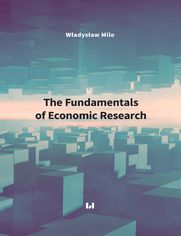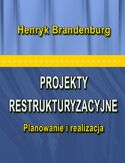The Fundamentals of Economic Research - Onepress

ISBN: 978-83-8142-150-8
stron: 318, Format: ebook
Data wydania: 2018-10-17
Księgarnia: Onepress
Cena książki: 21,20 zł (poprzednio: 24,65 zł)
Oszczędzasz: 14% (-3,45 zł)
In this monography there are presented and discussed the following categories of concepts: truth and causes, randomness, isomorphism, homomorphism, models, modelling, expectations, tools and effects of the use of monetary policy, potentia and calculus of potentias, theory and theorizing.
These categories make themes of successive chapters of this book. It seeks to provide both theoretical and empirical foundations for doing economic research by economists, econometricians, financiers, and management scientists who want to deepen their economic and methodological backgrounds.
The author presents the essence of the considered concepts from the point of view of the philosophy of science, logic, mathematics, economics and finance, as well as, empirical testing of models and theories.
Osoby które kupowały "The Fundamentals of Economic Research", wybierały także:
- Analiza biznesowa. Praktyczne modelowanie organizacji 39,90 zł, (19,95 zł -50%)
- TO TWOJA FIRMA. 12 KROKÓW DO SUKCESU 39,90 zł, (19,95 zł -50%)
- Design Thinking dla przedsiębiorców i małych firm. Potęga myślenia projektowego w codziennej pracy 34,90 zł, (17,45 zł -50%)
- Sygnał i szum. Sztuka prognozowania w erze technologii 49,00 zł, (24,50 zł -50%)
- RozGROMić konkurencję. Sprawdzone w boju strategie dowodzenia, motywowania i zwyciężania. Wydanie II rozszerzone 49,00 zł, (24,50 zł -50%)
Spis treści
The Fundamentals of Economic Research eBook -- spis treści
Preface 9
Chapter 1. Truth and causes 13
1.1. Introduction 14
1.2. Notions of truth 15
1.2.1. Truth definitions 17
1.2.2. Determinants of quality of truthfulness criteria 27
1.3. Notions of cause 32
1.4. Criteria for causality 54
1.5. Final notes 62
Bibliography 63
Chapter 2. On randomness 73
2.1. Introduction 74
Qualitative concepts of randomness from antiquity until the XIX c. 75
2.3. Final remarks 93
Bibliography 94
Chapter 3. Isomorphisms, homeomorphisms, models and modeling 97
3.1. Introduction 98
3.2. Homeomorphisms and Isomorphisms 99
3.2.1. Intuitive characterizations of Homm & Isomm 99
3.2.2. Formal characterizations of Homm 104
3.2.3. Isomorphisms 106
3.3. Homeomorphism, isomorphism and models 112
3.3.1. Category of model 114
3.4. Principles of and problems related to modeling 120
3.5. Final remarks 126
Bibliography 126
Chapter 4. On models and modeling 129
4.1. Introduction 129
4.2. The essence of models 130
4.2.1. Fundamental questions 132
4.3. Domains and co-domains of models 140
4.4. Kinds of models 143
4.5. More specific forms of models 148
4.6. Modeling and principles of modeling 150
4.7. Models and modeling in economics 162
4.8. Final remarks 170
Bibliography 171
Chapter 5. On expectations. Part I 175
5.1. Introduction 175
5.2. Concepts of rationality 178
5.3. Rational expectations and rational predictions 183
5.4. Adaptive rational expectations and predictions 188
Bibliography 192
Chapter 6. On expectations. Part II 195
6.1. Introduction 195
6.2. Non-adaptive rational economic expectations: theories and models 197
6.2.1. H. Working’s theory of rational economic expectations 206
6.2.2. J. Muth’s theory of rational economic expectations 209
6.2.3. R. E. Lucas, Jr.’s theory of rational economic expectations 214
6.2.4. T. J. Sargent’s theory of rational economic expectations 219
Bibliography 226
Chapter 7. On expectations. Part III 229
7.1. Introduction 229
7.2. Remarks on J. M. Keynes’ and H. Working’s theories of expectations 230
7.3. Remarks on J. Muth’s theory of rational expectations 234
7.4. Remarks on R. E. Lucas’ and T. Sargent’s theories of rational economic expectations 236
7.4.1. Lucas’ theory 236
7.4.2. T. J. Sargent’s theory 239
Bibliography 243
Chapter 8. Methodological problems of choosing the instruments and effects of monetary policy 245
8.1. Introduction 246
8.2. Tools of monetary policy 250
8.3. Effects of monetary policy tools 258
8.4. Final remarks 266
Bibliography 268
Chapter 9. Calculus of potentials in physics, mathematics and economics 271
9.1. Introduction 271
9.2. The measurement and calculus of potentials in physics 272
9.3. The measurement and calculus of potentials in mathematics 280
9.3.1. Classical results 280
9.4. Non-classical results 289
9.5. Measuring potential in economics 290
9.5.1. Examples of empirical applications 296
Bibliography 298
Chapter 10. On theories and theorizing 303
10.1. Introduction 303
10.2. Theories in logic 304
10.3. Theories in mathematics 307
10.4. Theories in some other fields of science 309
10.5. Final remarks 316
Bibliography 317





